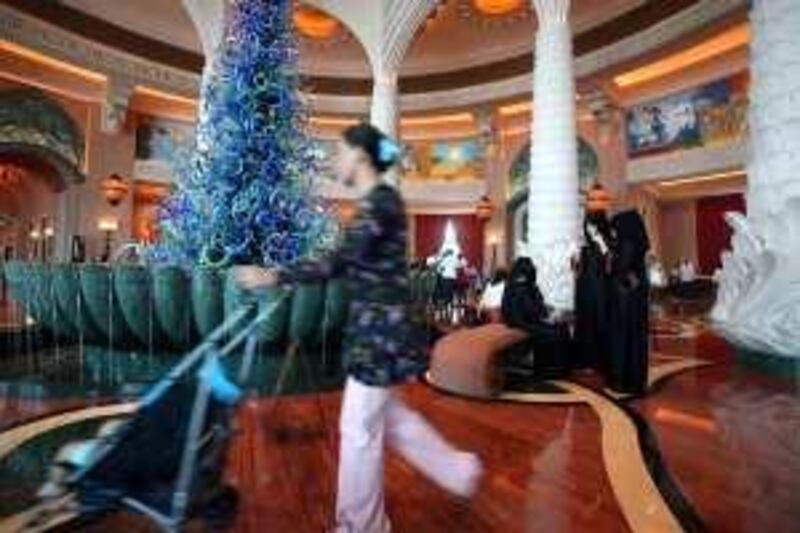Dubai hotels experienced a substantial improvement in performance last month following sharp declines in revenues in the first half of the year, as promotional efforts start to have an effect. Hotels in Dubai saw a 24 per cent fall in revenue per available room (REVPAR), the key measure for the health of the industry, to US$107.09 (Dh393.35) last month compared with $141.03 in the same month last year, according to data from STR Global.
But this represented a vast improvement compared with the 33.9 per cent decline seen in the previous month. "The Middle East finally showed some signs of improvement, with Dubai making significant gains," said James Chappell, the managing director of STR Global. Occupancy levels for Dubai hotels increased last month compared with June, but were down from last year. Occupancy was 65.1 per cent last month compared with 71.7 per cent in July of last year.
Average daily rates were down 16.4 per cent to $164.48. Hoteliers, Emirates Airline and the Dubai Department of Tourism and Commerce Marketing (DTCM) have worked together in a campaign to lure more tourists to the emirate at a time of reduced global demand. This has included aggressive discounting, promotional deals and increased advertising, as well as substantial marketing efforts to attract more visitors from the Gulf region.
Dubai is aiming to attract 15 million visitors a year by 2015, which is almost double the number of visitors the emirate hosted last year. Tourism is the largest single contributor to Dubai's GDP. Last year it directly added 19 per cent and indirectly contributed 32 per cent. The DTCM last week said five-star beach hotels recorded 97 per cent occupancy in the second week of this month, while five-star city hotels posted 76 per cent occupancy and four-star hotels had 81 per cent.
"The responses by the industry in Dubai are absolutely working," said Alex Kyriakidis, the global managing partner at Deloitte Tourism, Hospitality and Leisure. "Clearly, pricing is the key weapon that everyone is using. We are seeing a far greater proportion of GCC nationals coming to Dubai because it is far more affordable than this time last year." Mr Kyriakidis said getting more people into Dubai's hotels, even at reduced room rates, was a sensible strategy in the current environment.
"That footfall spends money on food and beverage, retail and leisure, and those elements are obviously enjoying the benefit of the footfall in the property," he said. As well as a downturn in global demand, Dubai's hotels have also had to contend with an increase in room supply in the emirate. Dubai has 58,147 hotel rooms, a 17 per cent rise on the number of rooms it had at the same time last year, the DTCM said.
The timing of Ramadan could also have had some effect, according to STR Global. "Ramadan is earlier this year and that may have caused a flurry of travel in advance of the holiday," said Mr Chappell. For the Middle East as a whole, there was a 16.3 per cent drop in REVPAR to $103.17 last month from $123.27 in July last year. Occupancy levels were down to 61.1 per cent from 68.1 per cent. Beirut experienced the largest increase in the region, with REVPAR up 74 per cent last month to $256.15.
Muscat saw a 29.1 per cent fall in occupancy to 34.7 per cent, while Riyadh's occupancy levels dropped 28.4 per cent to 51.7 per cent. rbundhun@thenational.ae






